The Groovemaster & Jaco Pastorius
Jaco Pastorius is considered by many to be the greatest bass player who ever lived.
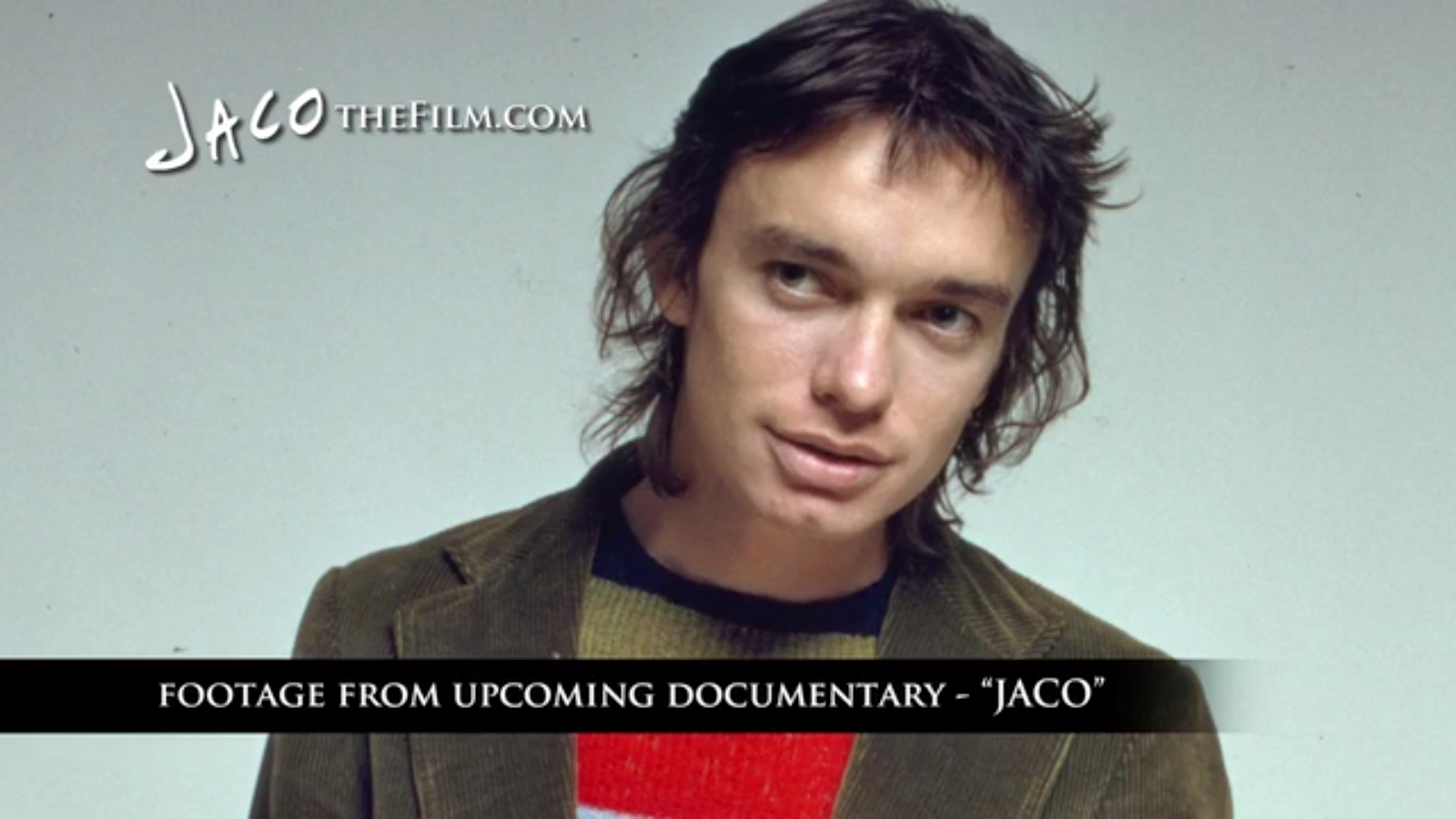
 bitte s. Unten
bitte s. Unten
Jaco
Even today, 30 years after his death, he remains ever-present in the figure in contemporary music. In 2014, Robert Trujillo, the bassist for the band Metallica, produced an excellent documentary film entitled “Jaco.” If you are interested in learning more, buying the DVD or streaming the film is a great place to start.
Jaco had a brief life with a tragic end. Plagued by mental illness he slipped from musical stardom to periods of homelessness – sleeping in doorways and parks. After being turned away from a night club in Florida he was tragically killed by the club's bouncer who had a black belt in karate.
If you didn't catch the first portion of this interview with the Groovemaster, Jerry Jemmott, you can read the introduction and brief biographical sketch here
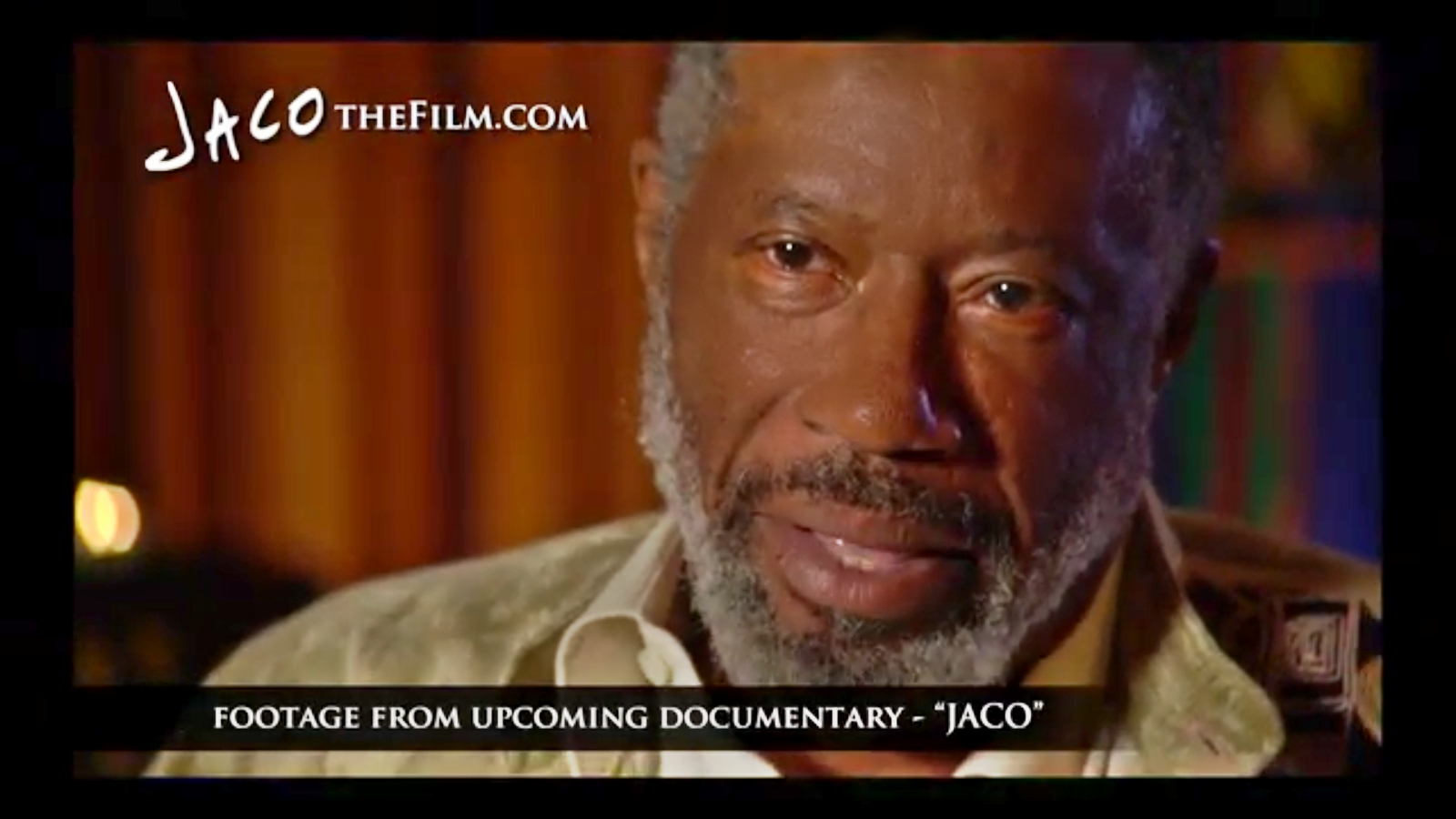
Interview with the Groovemaster, Jerry Jemmott
Part two Jaco Pastorius
Alan Bryson: Let's talk a bit about Jaco Pastorius. First, I was wondering how he first came up on your radar, not when you first met him, but when you first heard him.
Jerry Jemmott: From Jimmy Tyrell, who, at the time, was a vice president at Columbia Records. When I came into the business, he was one of the bass players who was in a position of power. He and Bob Bushnell were the black guys doing most of the work, so after Jimmy moved up, Chuck Rainey and I had became the "guys."
So Jimmy would send me a bunch of records, and one of the records he sent me was Jaco's. I remember it distinctly, I'd never heard of him before, and I thought, "Wow, this cat is something!" And then later I found out I was one of his heroes.
Then we met around 1981 or 1982. I was introduced to him by a bass and guitarist named Pablo Nahar. He worked around Europe from his home base in Amsterdam, but he was from Suriname. He gave me Jaco's phone number and I called him up and he came over to my house and we started hanging out.
We developed a good relationship, he was good people, he had a clear vision of, as he would say, "leaving something for the kiddies."
Genius?
Alan Bryson: When you were hanging out, did you have the feeling you were with someone extraordinary, a genius?
Jerry Jemmott: You knew he was gifted, and he was a bundle of energy. In all the time we spent together we never got high together. We were straight and focused on getting the video done, and it took us four years. He was all about sharing what he had with other people.
Alan Bryson: There a great quote from Jaco, a reporter once asked him where he thought the future of music was heading, and Jaco said something like, "Well, tomorrow I'm heading to Miami." (Jerry cracks up) Did you also see him as perhaps the greatest bassist on the planet at that time?
The Greatest?
Jerry Jemmott: Oh, without a doubt. He didn't just have a command of the instrument; he had the music in his head. It flowed from the beginnings I came from, and while I might have thought along similar lines, his talent and skill allowed him to accomplish some things I had only thought about.
As human beings we live like monkey-see-monkey-do, so once someone does something, you realize it can be done. He did the things that seemed impossible, and without his example I might not have even considered going in that direction. Like I'd fooled around with harmonics when I began playing electric bass, but I'd never really explored them. He took it to another level. Like most bass players, I had used a harmonic octave in the high register, but he found all the upper harmonics on the instrument that I didn't even know existed.
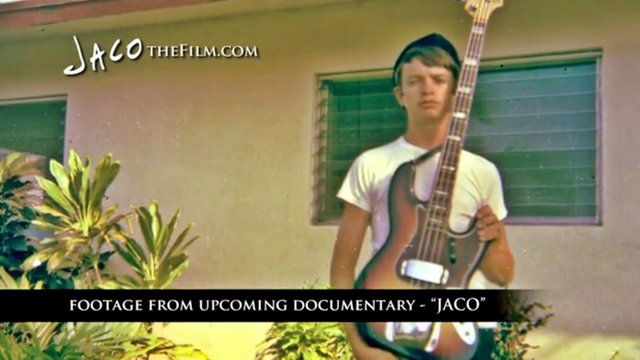
Alan Bryson: And when he talked to you about filing the frets off of his bass. Now that it's been done, it's like sure, that's an option. But to be bold enough to do that. From playing guitar I would never consider that, because I would have imagined the strings would have rattled or buzzed against the fingerboard.
Jerry Jemmott: Right, it would be the same thing on a fretless bass, it would have to be perfectly arched, and your fingers would have to be in the perfect spot. He just went for it. Then he did the thing with putting polyurethane and epoxy coating on the neck after filing it down to help spaces. He was on it!
Alan Bryson: I wonder if you agree with this, but this idea of overcoming the frets is something important that he shared with Duane Allman. Jaco filed his down, and Duane did it with his slide.
Jerry Jemmott: Hey, that's right! Great analogy. I never thought of it like that, but the slide does give it that bending quality that gets beyond the static note.
Was he out of control?
Alan Bryson: You know, from reading about Jaco, you get the impression that by the '80s he was kind of out of it, and wild. But on the video you did together he seemed so lucid, and grounded, and funny. So the black-and- white biographical sketches of him that portray him as flipped-out in the '80s aren't necessarily true?
Jerry Jemmott: There might have been some episodes and some events, and he was going through some stuff. But the music was very grounding to him. It gave him a focus, and this video was something he wanted to do, and he didn't want to do it without me, and he stuck to his word.
So what you saw on that video was someone on the job, some of the stuff what was said about him was probably true, and some was probably blown out of proportion. But a lot of things were true that his family and I knew about. He had lost his wife Ingrid, who I believe just passed away this year. But for that video he was grounded.
Alan Bryson: So you guys saw each other regularly during the '80s?
Jerry Jemmott: Yes, but it was generally something to do with this project or some other educational project—teaching and clinics. I might come and hang out with him at a session. He put a band together, but it didn't work out, and that's when I knew things were really getting bad for him. At that time he wasn't getting the respect he should have received from his fellow musicians.
He took a job he probably shouldn't have taken, and when you take those kinds of jobs it rarely works out well. But he took it for the money. Over the time we had been planning this he'd gone through a lot, he'd broken his arm in Europe and it was tough, but he manned-up when we did the video. He showed up early, and we left early. We were there at 8:30 and left an hour and a half early at 3:30—it was scheduled to go from nine to five.
Alan Bryson: Your conversation with Jaco for his Modern Electric Bass video is a great piece of history, a treasure for bass fans, and of course a must for modern electric bass players. You must be pretty proud of that achievement.
Jerry Jemmott: I wanted to promote his music and preserve his legacy, and you know, within the year he was gone. Of course I was shocked, but somehow not surprised. We did that video before we had signed a contract, so the publishers wanted to pay us royalties once a year, and through my work with B.B. King I knew the difference between getting paid quarterly as opposed to semi-annually. And I remember telling them, one of us could die between payments. Then that's exactly what happened.
Jaco was asking for money between payments, and was in jail, and got bailed out. But I believe if he had gotten his payment quarterly and hadn't needed the money, I don't think he would have gotten killed.
Alan Bryson: The interview on the video, that's really difficult what you did, but you made it look so natural. How did you do that, was someone holding up cue-cards or something?
Jerry Jemmott: Well first of all, we'd been working on that for three or four years. From the time we met we'd decided that we were going to do something. We were doing some teaching together and had that going on. So in a sense I was prepared, but I didn't know when it was going to happen. So when it finally took shape, I found out two days prior to the taping. So the night before I wrote down 20 questions, so you might notice me looking at a yellow pad.
Alan Bryson: No I didn't notice that. Because I interview people I was really impressed, and I appreciate how difficult that was.
Jerry Jemmott: I knew what he wanted to get out, so I wrote the questions with that in mind, and I tried to be a little provocative. I wanted to make him look good and keep him in good spirits—you know that was a difficult time for him.
Alan Bryson: In one sense you got paid very well, because when you asked him about some of his primary influences and asked him to pick one, he played one of your own licks back to you and said, "Enough said?" Something like that is cool, but to have it on video, that's priceless, it doesn't get any better than that.
Jerry Jemmott: [Laughing] I wasn't prepared for that! The way he could just summon up something like that, he was just an incredible musician.
Jerry Jemmott Interview / Deutsch
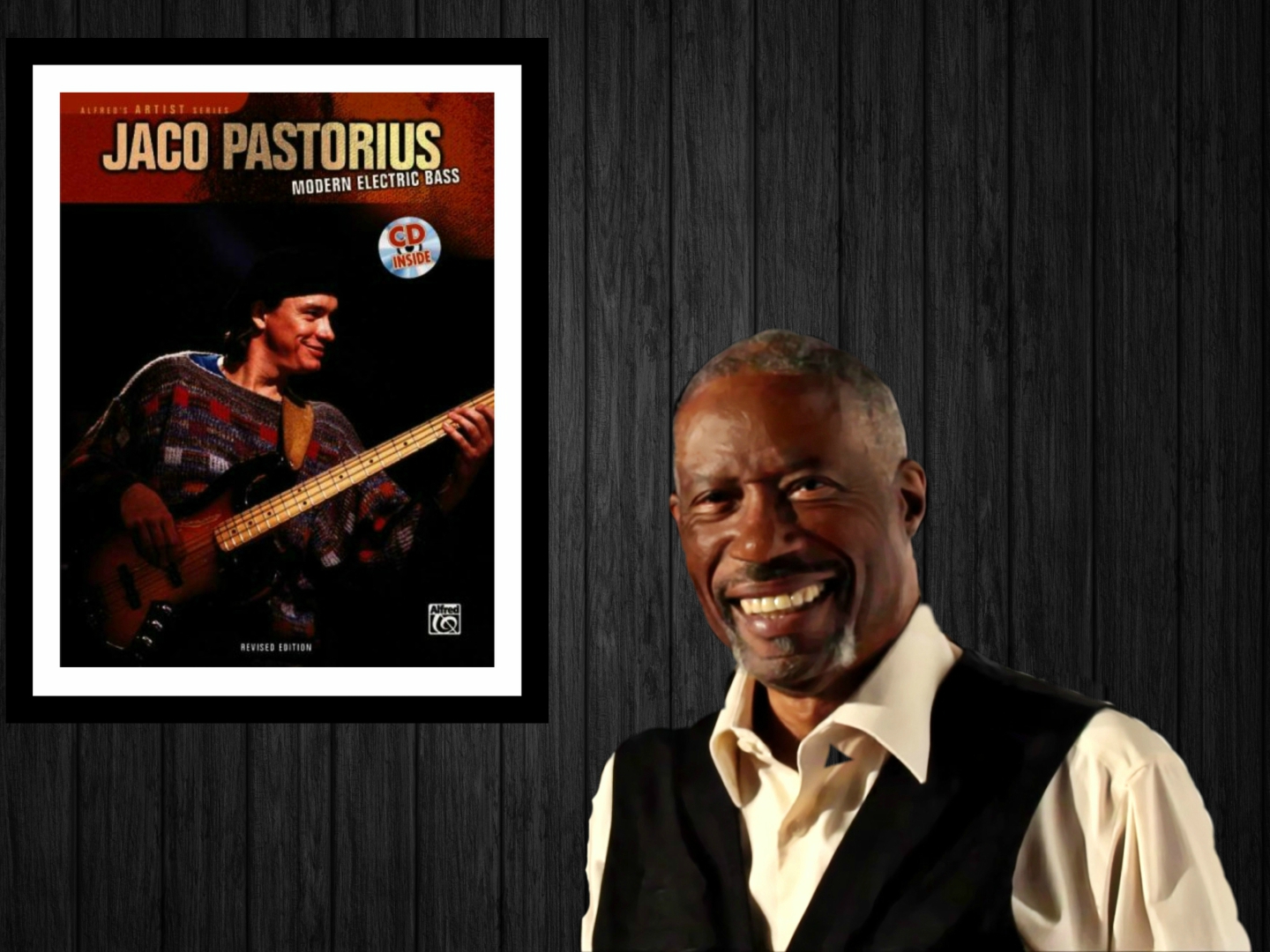
Jaco Pastorius gilt als der vielleicht beste Bassist aller Zeiten.
Heute noch, 30 Jahre nach seinem Tod, ist er in der Musikerszene allgegenwärtig. 2014 produzierte der Bassist von Metallica, Robert Trujillo, einen exzellenten Dokumentarfilm mit dem Titel "Jaco". Wenn du daran interessiert bist, mehr zu erfahren, ist die DVD oder das Streamen des Films ein sehr guter Anfang.
Jaco hatte ein kurzes Leben mit einem tragischen Ende. Von psychischer Krankheit geplagt, rutschte er vom Musikstar in die Obdachlosigkeit – er schlief zeitweise in Gebäubeeingängen und Parks. Nachdem er von einem Nachtclub in Florida abgewiesen wurde, wurde er tragischerweise von dem Türsteher des Clubs getötet, der einen schwarzen Gürtel in Karate trug.
Falls du den ersten Teil dieses Interviews mit dem Groovemaster, Jerry Jemmott, nicht gelesen hast, kannst du hier die Einführung und eine kurze biographische Skizze lesen.
Interview mit dem Groovemaster, Jerry Jemmott - Teil zwei Jaco Pastorius
Alan Bryson: Lass uns ein wenig über Jaco Pastorius sprechen. Wie kam er zum ersten Mal auf deinen musikalischen Radar -- nicht als du ihn das erste Mal getroffen hast, sondern als du ihn das erste Mal gehört hast?
Jerry Jemmott: Von Jimmy Tyrell, der zu dieser Zeit Vizepräsident bei Columbia Records war. Als ich ins Geschäft kam, war er einer der Bassisten, der in einer Machtposition war. Er und Bob Bushnell waren die Sessionplayers, die die meiste Arbeit machten. Nachdem Jimmy ins Management aufgestiegen war, sind Chuck Rainey und ich die "Neuen" geworden.
Also würde Jimmy mir gelegentlich einige Platten schicken, und eine der Platten, die er mir schickte, war Jacos. Ich erinnere mich deutlich daran, ich hatte noch nie zuvor von ihm gehört, und ich dachte: "Wow, dieser Kerl ist was Besonderes!" Und später fand ich heraus, dass ich einer seiner Idole war.
Dann trafen wir uns um 1981 oder 1982. Ich wurde ihm von einem Bassisten und Gitarristen namens Pablo Nahar vorgestellt. Er arbeitete von seiner Heimatbasis in Amsterdam in ganz Europa, aber er kam aus Suriname. Er gab mir Jacos Telefonnummer und ich rief ihn an und er kam zu mir nach Hause.
Wir entwickelten eine gute Beziehung, er war ein guter Mensch, er hatte eine klare Vision, wie er zu sagen pflegte, "er wolle für seine Kinder etwas hinterlassen".
Genie?
Alan Bryson: Hattest du das Gefühl, als wärst du mit jemandem zusammen, der außergewöhnlich war, ein Genie?
Jerry Jemmott: Man wusste, dass er talentiert war, und er war ein Energiebündel. In der ganzen Zeit, die wir zusammen verbracht haben, sind wir nie zusammen high geworden. Wir waren zielstrebig und konzentrierten uns darauf, das Video fertigzustellen, und es dauerte vier Jahre. Ihm ging es darum, mit anderen Leuten sein Wissen zu teilen.
Alan Bryson: Es gab ein großartiges Zitat von Jaco, ein Reporter fragte ihn einmal, wohin geht die Zukunft der Musik, und Jaco antwortete: "Nun, morgen fliege ich nach Miami." (Jerry lacht) Hast du ihn damals als den vielleicht größten Bassisten der Welt gesehen?
Der Größte?
Jerry Jemmott: Oh, ohne Zweifel. Er hatte nicht nur das Instrument beherrscht; Er hatte die Musik in seinem Kopf. Es kam von den gleichen Quellen aus denen ich kam, und obwohl ich vielleicht in ähnlicher Weise gedacht hatte, sein Talent und seine Fähigkeiten erlaubten ihm einige Dinge zu vollbringen, über die ich nur nachgedacht hatte.
Als Menschen äffen wir alles nach. Also wenn jemand etwas macht, merkt man, dass es getan werden kann. Er tat Dinge, die unmöglich schienen. Ohne sein Beispiel hätte ich vielleicht nicht einmal in Erwägung gezogen, in diese Richtung zu gehen. Ich hatte mit Obertönen herumgespielt, als ich mit E-Bass anfing, aber ich hatte sie nie wirklich erforscht. Er hat es auf eine ganz andere Ebene gebracht. Wie die meisten Bassisten hatte ich eine harmonische Oktave im hohen Register verwendet, aber er fand alle Obertöne auf dem Instrument, von denen ich nicht einmal wusste, dass sie existieren.
Alan Bryson: Im Video hat er mit dir darüber gesprochen, wie er die Bünde (Querstrebe) von seinem Bass wegmachte. Nachdem er das getan hat, ist das nun eine Option. Aber er war mutig, das zu tun. Als Gitarrenspieler hätte ich das nie in Betracht gezogen, denn ich hätte mir gedacht, die Saiten hätten am Griffbrett gerüttelt oder gesummt.
Jerry Jemmott: Richtig, bei einem „Fretless-Bass“ wäre es genauso, er müsste perfekt gebogen sein, und deine Finger müssten an der perfekten Stelle sein. Er hat es einfach gemacht. Dann ging er weiter, indem er Polyurethan und Epoxy-Beschichtung auf den Hals anbrachte.
Alan Bryson: Ich frage mich, ob du dies auch so siehst, aber dieser Wunsch die Bünde zu eliminieren, ist etwas wichtiges, das er mit Duane Allman (Slide Gitarrist) teilte. Jaco entfernte seine Querstrebe, und Duane tat es mit seiner Slide.
Jerry Jemmott: Hey, das stimmt! Eine große Analogie. Ich habe nie so darüber nachgedacht, aber die Slide gibt ihr eine Qualität, die über die statische Note hinausgeht.
Stimmt sein Image?
Alan Bryson: Wenn man über Jaco liest, hat man den Eindruck, dass er in den Achtzigern ganz schön wild war. Aber auf dem Video, das ihr zusammen gemacht habt, wirkte er so klar im Kopf, durchdacht, und witzig. Also fragt man sich, ob die schwarz-weiß biographischen Skizzen von ihm der Wahrheit entsprechen, wenn sie ihn in den 80er Jahren als ausgeflippt darstellen?
Jerry Jemmott: Es könnte einige Episoden und einige Ereignisse gegeben haben, und er hat einiges durchgemacht. Aber die Musik war ihm sehr wichtig. Sie gab ihm einen Fokus, und dieses Video war etwas, was er tun wollte, und er wollte es nicht ohne mich machen, und er hielt an seinem Wort fest.
Also, was du in diesem Video gesehen hast, war jemand bei der Arbeit, einige der Sachen, die über ihn gesagt wurden, waren wahrscheinlich wahr, und einige waren wahrscheinlich völlig übertrieben. Aber für dieses Video war er geistig voll dabei.
Alan Bryson: Habt ihr euch in den 80er Jahren regelmäßig gesehen?
Jerry Jemmott: Ja, aber es hatte im Allgemeinen etwas mit diesem Projekt oder einem anderen Bildungsprojekt zu tun. Gelegentlich habe ich ihn im Studio besucht. Er hat eine Band zusammengestellt, aber es hat nicht geklappt, und da wusste ich, dass die Situation für ihn wirklich schlecht geworden war. Zu dieser Zeit erhielt er nicht den Respekt seiner Musikerkollegen, den er hätte erhalten sollen.
Er hat einen Job angenommen, den er wahrscheinlich nicht hätte nehmen sollen, und wenn man solche Jobs macht, geht das selten gut aus. Aber er tat es für das Geld. Im Laufe unserer Planungszeit hatte er viel durchgemacht, er hatte sich in Europa den Arm gebrochen, und es war wirklich hart, aber er riss sich zusammen um das Video zu machen.
Alan Bryson: Dein Gespräch mit Jaco für sein Modern Electric Bass Video ist ein großartiges Stück Geschichte, ein Schatz für Bassfans und natürlich ein Muss für moderne E-Bassisten. Du müsstest ziemlich stolz auf diese Leistung sein?
Jerry Jemmott: Ich wollte seine Musik fördern und sein Vermächtnis bewahren, und du weißt, innerhalb dieses Jahres ist er gestorben. Natürlich war ich schockiert, aber irgendwie nicht überrascht. Wir haben dieses Video gemacht, bevor wir einen Vertrag unterschrieben haben, also wollten die Verleger uns einmal im Jahr Lizenzgebühren zahlen, und durch meine Arbeit mit B. B. King wusste ich den Unterschied zwischen vierteljährlich und halbjährlich. Und ich erinnere mich, dass ich sagte, einer von uns könnte zwischen den Zahlungen sterben. Dann ist genau das passiert.
Er war Inhaftiert und wurde auf Kaution frei und brauchte Geld. Jaco fragte zwischen den Zahlungen nach Geld und ich glaube, wenn er seine Zahlung vierteljährlich bekommen und das Geld nicht gebraucht hätte, wäre er nicht getötet worden.
Alan Bryson: Das Interview auf dem Video, das ist wirklich schwierig, was du gemacht hast, aber du hast es so natürlich aussehen lassen. Wie hast du das gemacht, hat jemand Moderationskarten gehalten oder so?
Jerry Jemmott: Nun, zuerst hatten wir schon drei oder vier Jahre daran gearbeitet. Wir haben zusammen Basskliniks unterrichtet, und das ging. In gewisser Weise war ich darauf vorbereitet, aber ich wusste nicht, wann es passieren würde. Als der Film endlich Gestalt annahm, habe ich das erst zwei Tage vor der Aufnahme herausgefunden. In der Nacht zuvor habe ich also 20 Fragen niedergeschrieben – vielleicht hast du bemerkt, dass ich auf einen gelben Block schaue.
Alan Bryson: Nein, das habe ich nicht bemerkt. Weil ich Leute interviewe, war ich sehr beeindruckt und ich weiß zu schätzen, wie schwierig das war.
Jerry Jemmott: Ich wusste, was er rüberbringen wollte, also schrieb ich die Fragen in diesem Sinne, und ich versuchte, ein wenig provokativ zu sein. Ich wollte, dass er gut aussieht und in guter Stimmung bleibt - du weißt, dass es eine schwierige Zeit für ihn war.
Alan Bryson: Abgesehen vom Geld, bist du in gewisser Hinsicht sehr gut belohnt worden, denn als du ihn nach einigen seiner wichtigsten Einflüsse fragtest und ihn gebeten hast, einen auszuwählen, spielte er dir einen deiner eigenen „Licks“ vor und sagte: "Genug gesagt?" So etwas ist cool, aber um es auf Video zu haben, das ist unbezahlbar, besser geht’s nicht.
Jerry Jemmott: [Lacht] Ich war darauf nicht vorbereitet! So wie er so etwas aus dem Stegreif spielen konnte! Er war einfach ein unglaublicher Musiker.
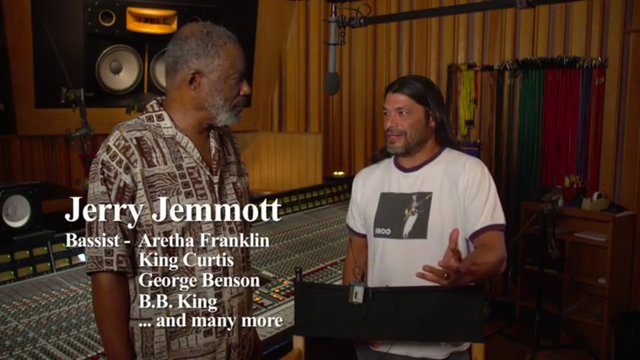 Jerry Jemmott with Robert Trujillo, the bassist for the band Metallica discussing the film "Jaco."
Jerry Jemmott with Robert Trujillo, the bassist for the band Metallica discussing the film "Jaco."
Thanks for stopping by! You can visit my main page for more
Photos screen captures from the original crowd funding video for the film "Jaco"-- effects by @roused
Lead photo for the German section is a collage from a YouTube screen capture and cover photo -- effect by @roused
The English version of my interview was first published on AllAboutJazz / German translation for Steemit by @roused
Check out Jerry Jemmott's website for books, DVDs,CDs


what's up man? steemit been pretty good to you lately? (-: crazy times. yeah, i like jazz music, haven't heard a lot of Jaco per se, but I'm always playing 60s and 70s jazz albums on youtube , peace !
SBD is tearing it up right now, that is a welcome Christmas surprise for us all :-) Jaco was more than just a great bass player, he had a beautiful and sophisticated musical mind. You might want to check out his music.
Hammer.